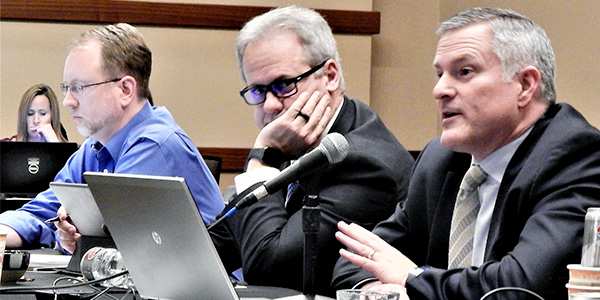By Tom Kleckner
HITT Wraps Up its Educational Work
SPP’s Holistic Integrated Tariff Team (HITT) wrapped up the educational portion of its work last week and will now begin refining the high-level recommendations it will make to the Board of Directors.
SPP General Counsel Paul Suskie, who serves as the HITT’s staff secretary, offered several suggestions on how the group might take the information and data it has gathered “and assimilate it into a report.”
Suskie broke down the recommendations into sub-sections dealing with transmission planning, congestion rights and hedging, and resource adequacy, among others. However, no action was taken to endorse any recommendations during the team’s Dec. 4-5 meeting, with stakeholders suggesting some of the concepts discussed be addressed by other working groups.
The HITT has an April 2019 deadline for delivering a report on the optimal alignment of SPP’s planning processes, cost-allocation methodologies, and market products and services.
New Staff Secretaries for MOPC, SPC
SPP announced Dec. 6 that senior executives Lanny Nickell and Barbara Sugg will take over the staff secretary positions on two of its most important committees, the Markets and Operations Policy Committee and Strategic Planning Committee, respectively.
The MOPC, relying on stakeholder groups, develops and recommends policies and procedures to the board. The SPC is responsible for the RTO’s strategic direction.
Nickell, vice president of engineering, will assume the MOPC’s reins from COO Carl Monroe, who has filled that position for 18 years. Monroe will continue to directly engage with the committee as a resource, CEO Nick Brown said.
Sugg, SPP’s IT vice president and chief security officer, will replace Michael Desselle, who served as the SPC’s staff secretary for 10 years.
Brown said the appointments will allow Nickell and Sugg “to continue [their] professional development and service to SPP.” He made the announcement in a pair of emails to stakeholders.
SPP’s Sorenson has Role at Bush Funeral
The SPP Market Monitoring Unit’s Greg Sorenson, a supervisor of market surveillance, was part of a special naval escort for dignitaries and family members attending President George H.W. Bush’s funeral ceremonies in D.C. last week.
Sorenson, a lieutenant commander in the U.S. Navy Reserve, arrived in the capital Dec. 2 to join 10 other Navy officers in escorting visitors at Andrews Air Force Base and the National Cathedral. Sorenson was present at Andrews when Air Force One landed with Bush’s body and met Sully, the president’s service dog.
“I had to rearrange some things, but [SPP was] very accommodating in allowing me to do this for our country,” Sorenson told the Northwest Arkansas Democrat-Gazette.
Staff Eyeing FERC Filing on Seams Projects
SPP staff were unable to gain stakeholder consensus last week on their proposal to change the criteria for regional funding of seams projects. The revision would apply to all seams projects unable to pass the interregional Order 1000 process and approved in an SPP regional study.
FERC in 2015 rejected SPP’s proposed category for seams projects and their associated cost allocation, saying the plan was too broadly drawn. (See FERC Rejects SPP Proposal for Seams Transmission Projects.)
At the Seams Steering Committee meeting Wednesday, several stakeholders suggested the effort to create Tariff language would be worthwhile. However, committee Chair Jim Jacoby, with American Electric Power, said he wasn’t sure the time and effort was worth it.
“It won’t fix anything on the MISO side,” Jacoby said, referring to the inability of the RTOs to agree on interregional projects. “Having something in the Tariff is a good thing, but I’m torn over the amount of effort it will take versus the benefits it will provide.”
Staff said they will continue discussions with the committee in 2019.
They also told the SSC they were close to finalizing revisions to the joint operating agreement governing the coordinated system plan for interregional projects with MISO. Staff said the RTOs hope to reach an agreement during the Interregional Planning Stakeholder Advisory Committee’s Dec. 20 conference call, and then prepare the JOA for FERC filings in January or February.
The RTOs have agreed to revise the JOA to improve the chances of funding interregional projects. The changes will eliminate the $5 million cost threshold for the projects, add avoided costs and adjusted production cost benefits to project evaluation, and remove the joint modeling requirement in favor of individual RTO regional analyses. (See MISO, SPP to Ease Interregional Project Criteria.)
M2M Payments Flow in SPP’s Direction Again

Staff told the SSC that the market-to-market (M2M) process wound up in SPP’s favor in October, reversing three consecutive months of net payments to MISO.
Flowgates along the seam were binding for a total of 663 hours on SPP’s side, resulting in more than $380,000 in M2M payments. SPP has now amassed $51.6 million in distributions since the two RTOs began the M2M process in March 2015.
Payments have flowed SPP’s direction 20 of the last 25 months.





